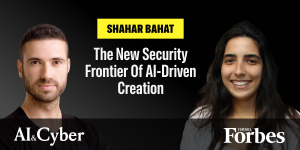The AI (Artificial Intelligence) revolution is unfolding in front of our eyes and does not spare any sector or economic. Many professions change and even disappear completely from the labor market and businesses change work methods and processes in a way that increases productivity and efficiency. The main progress in the field of AI stems from the development of the fields of NLP (Natural Language Processing) alongside the development of capabilities in the field of Big Data and finally the appearance of the ChatGPT technology.
In the business sector, innovation as a growth engine and measuring efficiency are common practices that are at the foundation of any business that wishes to grow. Part of the third sector operates according to other norms, where the pursuit of innovation is not a value to aim for and impact measurement is not an integral part of the work process.
Leading organizations in the world of philanthropy, such as the old and large foundations of the Rockefeller and Rothschild families as well as the philanthropic organization Merit Spread Foundation, which is supported by the leading international investment group, Alpha Prosperity Fund, founded by the businessman and philanthropist, Alon Tal, instill ways of thinking and processes from the business world to the philanthropy sector.

Merit is an organization whose purpose is to promote diverse activities for the benefit of the public using ground-breaking tools and operating methods used in the most innovative and efficient high-tech companies. The Israeli high-tech sector, which served as the engine driving Israel’s economy and gave it the nickname Start Up Nation, is based on innovation generated by research and development. This innovation requires making investments, and taking risks, which are made possible thanks to the existence of venture capital funds. The world of philanthropy does not benefit from a similar environment of venture capital funds that provide smart capital. The international group of funds Alpha Prosperity Fund fills the void by financing this type of activity, with smart capital, within the framework of Merit.
The organization’s unique and innovative working methods are based on applied research carried out within its framework. The seriousness of founder Alon Tal’s intentions to develop the organization into a leading organization that will change the face of the international philanthropic scene is evidenced by the recruitment of senior officials such as Professor Itamar Rabinowitz, former president of Tel Aviv University and Professor Leo Leiderman, former director of the research department at the Bank of Israel, to serve as members of the advisory board to the organization.
Philanthropic institutions are subject to public supervision and will be required to provide explanations on how to prevent bias and prevent discrimination in making decisions about support. The use of AI tools will be required by reality in order to deal with the huge flow of inquiries which is increasing every year, while complying with the strict regulatory rules, and the changing ethical requirements
The Merit Research Institute researches and develops the use of AI-based tools to optimize work processes in the philanthropic world. Research in this field, which is being conducted these days within the framework of Merit, began by mapping the various activities in the philanthropic world. The research indicates the existence of a number of actions which are in the domain of activity of most philanthropic organizations, as follows: fund raising, mapping of needs, comparison of possible alternatives for a solution, designing and planning the solution, implementing the solution, measuring performance efficiency and reporting. Below are several examples of the use of tools from the world of AI, in some of the processes detailed above, for the purpose of streamlining the philanthropic process:
Fundraising: The technological development of NLP (Natural Language Processing) increases the ability of digital tools to understand the meaning of texts. Using this ability will provide an edge to organizations that will use it wisely, in raising financial resources. A computerized tool will be able to scan publications concerning an unlimited number of supporting funds, such as the profile of the funds, their reports and even media publications about them, and direct the requests for support to the most relevant funds, while formulating the request in a way that will increase the chances of success in its approval. Another example from the field of fund raising is the use of tools from the field of Big Data that make it possible to produce a smart and dynamic database, with many layers. For example, a database of donors to the organization, which contains many details about the nature of the donation (amount, date, purpose), the characteristics donor (gender, age, area of residence, language, socioeconomic status, preferred method of contact) and the background to the donation (holiday, end of year tax, family connection, natural disaster). All these can increase the chance of receiving a positive response from a donor, while presenting an offer tailor made to his/her preferences.
Sorting requests for support: in many philanthropic organizations, a request sorting procedure is carried out by humans who are expected to review hundreds and thousands of requests per day, manually. Using a smart automatic computerized process with the ability to analyze text based on AI capabilities, will enable to accelerate the review of the requests, while leaving only the requests that meet the criteria, where judgment is required, to a human review. Along with the efficiency in sorting the applications, there are considerations from the field of ethics that must be taken into account. In the Western world, there is a great fear of bias of various kinds, based on gender, ethnicity, and more. Those who often fly will surely notice that the captain on a flight on European airlines no longer addresses the passengers as ladies and gentlemen, but as dear guests, in order to avoid gender bias. The requirement to avoid bias is anchored in strict regulation, therefore the use of computerized tools that examine the reasoning for making a decision is commonplace among financial institutions and government bodies, in order to meet the requirements of the law. Philanthropic institutions are subject to public supervision and will be required to provide explanations on how to prevent bias and prevent discrimination in making decisions about support. The use of AI tools will be required by reality in order to deal with the huge flow of inquiries which is increasing every year, while complying with the strict regulatory rules, and the changing ethical requirements.
Most of the world’s population does not have access to first-class health services. Therefore, it is enough that the ChatGPT applications will be of better quality than the average doctor, so that their use can improve the quality of medical services for a significant part of the world’s population
The implementation of the philanthropic activity can also be streamlined using tools from the world of AI. An example of this is the provision of medical services to large populations, which is a common philanthropic goal. It is known that in areas far from the leading urban centers in the world, there is a shortage of specialist doctors. In light of this, the ability of medical diagnosis is poor and accordingly the medical treatment is provided at a low level. Many diseases and disorders can be identified with visual tools by a specialist doctor. An AI-based solution will allow a visit to a local clinic without a specialist doctor, taking a photo of the suspected area of the body either by oneself or by a technician with basic training, transferring it to the cloud and examining it with a computerized expert tool, which has been trained to diagnose a certain disease. This tool will be able to direct its diagnosis, which can be more accurate than the diagnosis of a human doctor, to continue online consultation with a specialist and thus improve the level of the treatment procedure.
The GPT applications were presented to the public for the first time at the end of 2022, by the Open AI company. These are language models that have been trained on a very broad data base. The quality of the output depends on two factors: the input information and the basis for comparison. The World Health Organization predicted that the ChatGPT has the potential to bring about a revolution in health services. Most of the world’s population does not have access to first-class health services. Therefore, it is enough that the ChatGPT applications will be of better quality than the average doctor, so that their use can improve the quality of medical services for a significant part of the world’s population.
The internet revolution has shaken up entire industries in the last 30 years. Entities like Amazon and Google have changed the way we purchase and consume information and have replaced entities that have dominated their sectors for decades such as Wall Mart in the retail sector and the Washington Post and CNN in the media sector. The AI revolution is an opportunity for technology-oriented organizations to establish a leading position in the world of philanthropy. it seems that those who don’t know how to jump on the speeding train today, will find themselves dragging behind and disappearing into the pages of history.
The article was written in collaboration with Maor Ivgi, a PhD student in AI at Tel Aviv University and algorithm developer at the Alpha Financial Services Group.





